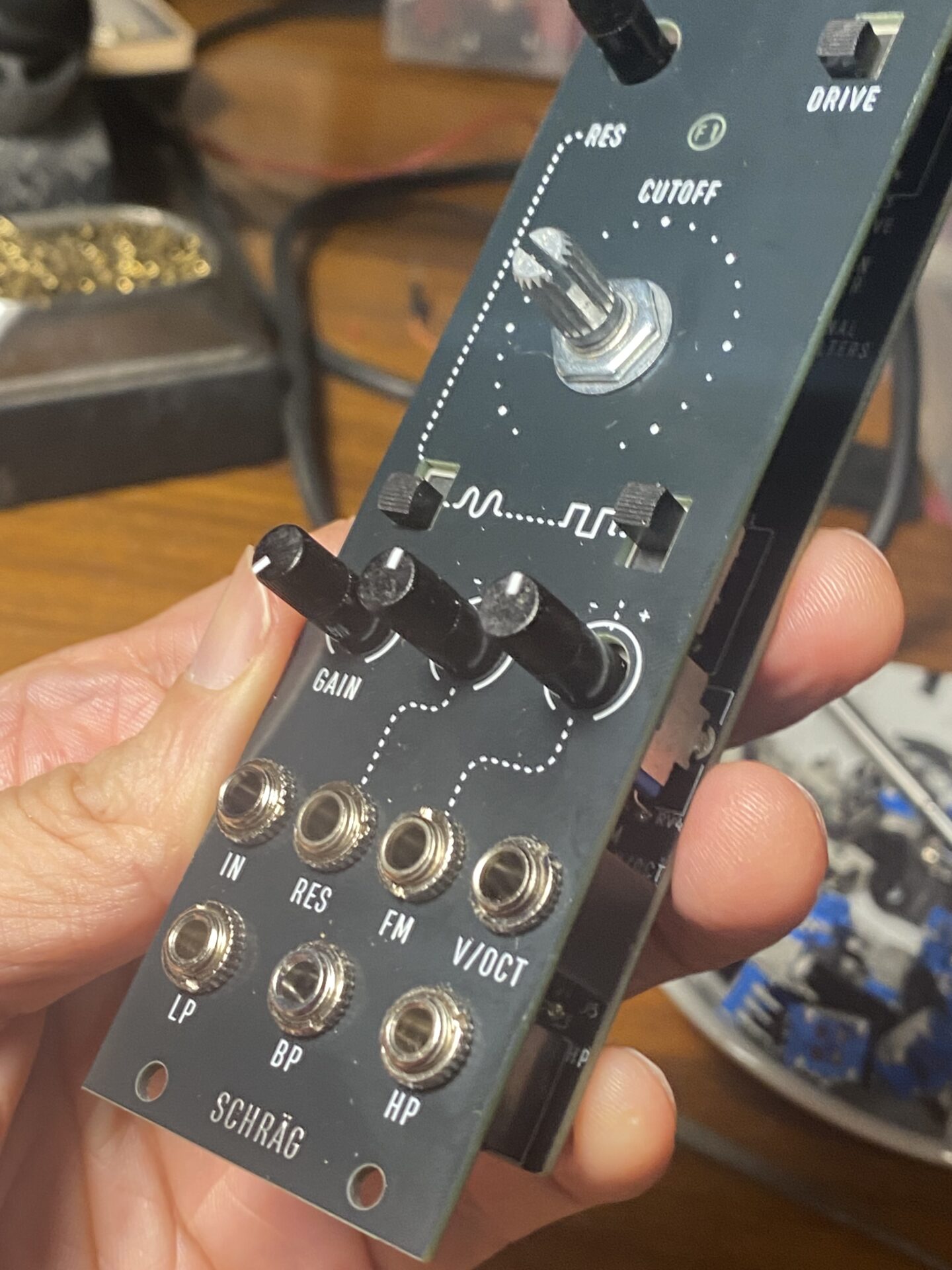I found the Schraëg filter while surfing the Modwiggler and lines forums. Described as “Schräg is an expanded repackage of the Bastl Cinnamon multimode filter”. It sounded interesting and I have wanted to try having a project manufactured by a service with SMD components.
In the discussion on lines, here, there was some discussion of modifications and a remix of this by another user, who posted their work to Github. I liked the design of this version so I chose to start with this project.
The files are all in Kicad. After getting up to speed with Kicad, I needed to tackle getting output compatible with an SMD manufacturing service. I chose to work with JLCPCB this time.
Besides berbers files to make the PCB we also need a BOM file in CSV, and a position file in CSV. Both of these need column headings that match what JLCPCB is expecting.

The Order Process
JLCPCB has a very convenient viewer that not only shows what the PCB will look when manufactured, it also shows the parts and where they will be placed. This really helpful, since more than a few the parts were not oriented correctly due to some translation issues between Kicad and JLCPCB. The viewer has options to adjust the orientation of parts making this easy to fix.
You’re limited to the parts on hand at JLCPCB, I think you can special order parts that they don’t have on hand but, it’s an extra cost. They seemed to have almost all of the parts. The one part they didn’t have was the V2164 VCA chip, in SOIC 16 size. I ordered few of these from Thonk.


The PCBs
The PCBs came in the mail after about two weeks. They look pretty good. I chose a matte/semi-gloss black for the front panel and the component PCB.
There is some glossy “smudges” here and there on a couple of the boards. Not sure what this is, it might oil from the manufacturing process or an imperfection in the finish? Overall the boards look pretty good.


Costs
If you’re going to have boards made you should consider the costs. Seems like it should be cheaper, but you’ll need to buy 5 boards, this is the minimum order at JLCPCB.
The front panels were $8.53 for 5. The back panel, with the parts, were $78.53. With shipping, tax and other fees the total came to: $139.19.
You can see most of the components were soldered by JLCPCB, they did not have V2164 in their catalog, I needed to order these myself and solder them by hand.
I ordered the V2164 and pots with the long plastic shafts from Thonk. I needed 5 V2164’s and 20 pots, this was $61.47.
I also needed 15 sliding switches. The only place to get these was Mouser. These cost $49.21. That was a lot for 15 switches!
I needed some jacks and some more pots. I got these from Tayda for: $19.84.
Let’s add all that up, these prices include shipping and taxes, this is what I paid. I did have to assemble them myself, through also all of the surface mount components were already soldered.
| PCBs | 139.19 |
| V2164 + pots | 61.47 |
| Switches | 49.21 |
| Jacks and pots | 19.84 |
| Total | 269.71 |
I could have bought one of a number of well respected filter for that. I did get 5 filter for my money, so that’s $53.94 per filter.
So per filter this is a good deal, of course I’m stuck with 5 filters, not sure If I can use them all, and they are all the same. If I was buying 5 filters I’d probably diversify.
I didn’t buy any knobs, so that will be another $10 to $15 added in the future.
Conclusion
I think this was a good experiment. I learned a lot about ordering PCBs using the assembly service and speccing parts. Cost wise it’s sort of a wash. If this was about getting a new musical device and making music, it might have been better to just buy something off the shelf. Owning 5 filters is not super useful, but I think I can find uses for at least two.
This particular filter sounds pretty good but, it has a paerticular “flavor” that might not be for everyone or every musical application.

Leave a Reply